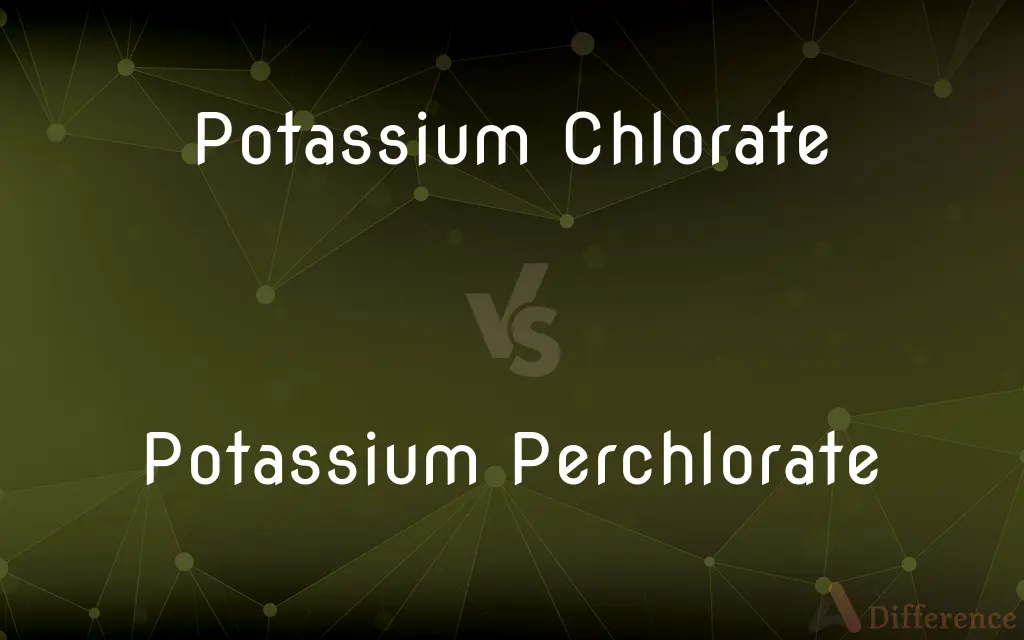Potassium Chlorate vs. Potassium Perchlorate — What's the Difference?
By Tayyaba Rehman — Published on November 5, 2023
Potassium Chlorate (KClO3) is an oxidizing agent, used in explosives and fireworks. Potassium Perchlorate (KClO4) is a superior oxidizing agent, with stability at higher temperatures, commonly used in fireworks and safety matches.

Difference Between Potassium Chlorate and Potassium Perchlorate
Table of Contents
ADVERTISEMENT
Key Differences
Potassium Chlorate (KClO3) is often utilized in pyrotechnics due to its ability to produce oxygen when decomposed, thus aiding the combustion of other materials. In contrast, Potassium Perchlorate (KClO4) also serves a similar purpose but is generally considered to be safer because it is more stable and reacts less readily with other substances. Both substances are critical in various industries; however, they have fundamental differences in their reactivity and stability.
Potassium Chlorate (KClO3) can be synthesized through the electrolysis of a potassium chloride solution. On the other hand, Potassium Perchlorate (KClO4) can be produced by the disproportionation of potassium chlorate, or via electrolysis of potassium chloride in an acidic solution at higher voltages. Their manufacturing processes underline chemical distinctions, correlating with their stability and reactivity.
While Potassium Chlorate (KClO3) has found usage in various applications, including disinfectants, herbicides, and in the textile industry, Potassium Perchlorate (KClO4) is specifically favored in circumstances that demand higher thermal stability, like in the production of safety matches and certain types of fireworks, due to its low reactivity with sulfur and other fuel compounds.
In the realm of pyrotechnics, both Potassium Chlorate and Potassium Perchlorate have distinct utility, though the latter is generally preferred for enhanced safety and storage reasons. When it comes to the decision-making process in their applications, the trade-off between reactivity and stability becomes a pivotal point of consideration.
Different safety protocols are associated with handling and storing Potassium Chlorate and Potassium Perchlorate. The former tends to be more reactive and, thus, poses a higher risk in certain reactive environments, while the latter, being thermally stable, is often chosen in situations that require additional safety or where higher temperatures are involved.
ADVERTISEMENT
Comparison Chart
Formula
KClO3
KClO4
Oxidizing Ability
Good
Superior
Thermal Stability
Lower
Higher
Reactivity
More Reactive
Less Reactive
Common Use
Explosives
Fireworks
Compare with Definitions
Potassium Chlorate
It can decompose to release oxygen and potassium chloride.
The decomposition of Potassium Chlorate is a popular method to generate oxygen in the laboratory.
Potassium Perchlorate
It's used as a medication to control certain types of thyroid diseases.
Doctors may prescribe Potassium Perchlorate to treat hyperthyroidism in specific cases.
Potassium Chlorate
It’s used in some types of disinfectants and herbicides.
Some herbicides contain Potassium Chlorate as it can disrupt the growth of unwanted plants.
Potassium Perchlorate
It's renowned for having better thermal stability than potassium chlorate.
Due to its thermal stability, Potassium Perchlorate is often used in safety matches.
Potassium Chlorate
It is a white crystalline substance that is soluble in water.
When dissolved in water, Potassium Chlorate forms a clear solution.
Potassium Perchlorate
It appears as a white solid and is soluble in water.
Potassium Perchlorate dissolves readily in water, making it versatile in various applications.
Potassium Chlorate
Potassium Chlorate is a chemical compound with potent oxidizing properties.
Potassium Chlorate is often utilized in fireworks due to its ability to release oxygen.
Potassium Perchlorate
In pyrotechnics, it's favored for its lower reactivity with sulfur and ammonia.
Potassium Perchlorate is preferred over chlorate in colorful pyrotechnic formulations due to its non-reactivity with ammonium compounds.
Potassium Chlorate
It's used in the production of safety matches.
Potassium Chlorate helps the matchstick head ignite due to its oxidizing nature.
Potassium Perchlorate
Potassium Perchlorate is an inorganic salt with strong oxidizing properties.
In the fireworks industry, Potassium Perchlorate is valued for its stability and oxidizing capabilities.
Common Curiosities
Can Potassium Chlorate be used in medicinal applications like Potassium Perchlorate?
Generally no, Potassium Perchlorate can be used in specific medicinal applications like treating hyperthyroidism, whereas Potassium Chlorate is not typically utilized in medicine due to its reactivity.
Why might someone choose Potassium Perchlorate over Potassium Chlorate in a formulation?
They might choose Potassium Perchlorate for its superior thermal stability and reduced reactivity with other pyrotechnic components, like sulfur and ammonia.
Are both Potassium Chlorate and Potassium Perchlorate soluble in water?
Yes, both compounds are soluble in water, forming clear solutions.
Can both Potassium Chlorate and Potassium Perchlorate serve as oxidizing agents?
Yes, both compounds act as oxidizing agents, though they have different levels of effectiveness and stability.
What is the basic use of Potassium Chlorate in industrial applications?
Potassium Chlorate is widely used in explosives, fireworks, and as an oxidizing agent in various industrial processes.
How do the chemical formulas of Potassium Chlorate and Potassium Perchlorate differ?
Potassium Chlorate has the formula KClO3, while Potassium Perchlorate has the formula KClO4.
What are the potential risks of handling Potassium Chlorate in a laboratory setting?
Risks include its high reactivity and the potential to fuel fires and explosions when combined with combustible materials or subjected to mechanical shock or friction.
How does the use of Potassium Perchlorate differ in fireworks from Potassium Chlorate?
Potassium Perchlorate is often preferred over Potassium Chlorate in fireworks due to its higher thermal stability and lower reactivity with other compounds, ensuring safer usage.
How does the thermal stability of Potassium Chlorate compare to that of Potassium Perchlorate in pyrotechnic applications?
Potassium Chlorate tends to have lower thermal stability compared to Potassium Perchlorate, making the latter more desirable in pyrotechnics for safety reasons.
Are there safety and storage differences between Potassium Chlorate and Potassium Perchlorate?
Yes, Potassium Chlorate is often considered to be more reactive and potentially hazardous, while Potassium Perchlorate tends to be more stable, especially under heat.
In what ways does Potassium Chlorate interact with other chemicals?
Potassium Chlorate can react with various chemicals, especially organic compounds, and can be hazardous due to its ability to release oxygen, which can fuel fires and explosions.
How is Potassium Perchlorate manufactured in the industry?
Potassium Perchlorate can be manufactured through the electrolysis of potassium chloride in an acidic solution or by the disproportionation of potassium chlorate.
Is Potassium Chlorate used in the production of disinfectants?
Yes, Potassium Chlorate can be used in the formulation of some disinfectants due to its oxidizing properties.
In what forms can Potassium Perchlorate be commonly found?
Potassium Perchlorate is commonly found as a white, crystalline, odorless solid and can also be available in solution form.
Are there specific regulations for transporting Potassium Chlorate and Potassium Perchlorate?
Yes, due to their oxidizing natures, both chemicals are subject to specific transportation regulations to ensure safety. The details of these regulations may vary by country or region.
Share Your Discovery

Previous Comparison
Premium Economy vs. Business Class
Next Comparison
Income Effect vs. Substitution EffectAuthor Spotlight
Written by
Tayyaba RehmanTayyaba Rehman is a distinguished writer, currently serving as a primary contributor to askdifference.com. As a researcher in semantics and etymology, Tayyaba's passion for the complexity of languages and their distinctions has found a perfect home on the platform. Tayyaba delves into the intricacies of language, distinguishing between commonly confused words and phrases, thereby providing clarity for readers worldwide.













































